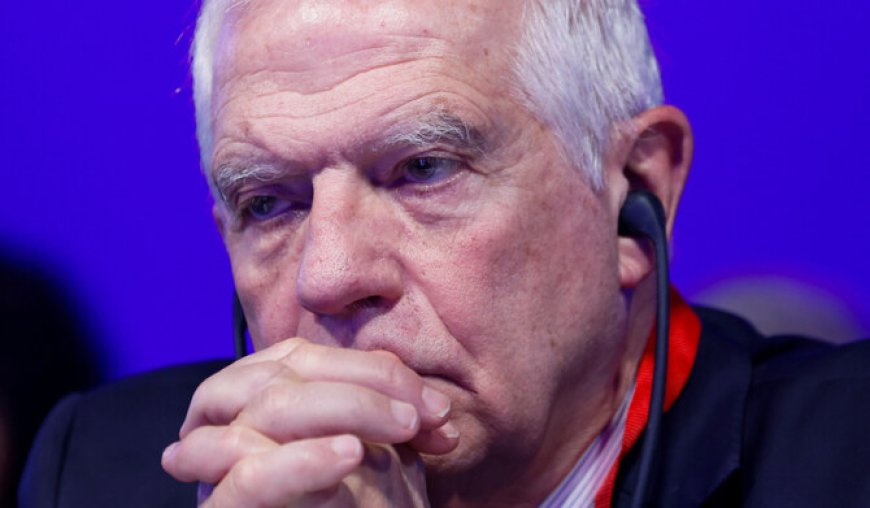EU Diplomat Says He Is Frustrated With Netanyahu's Resilient Position Among Growing Conflict
Josep Borrell, the European Union's High Representative for Foreign Affairs and Security Policy, voiced his great concern over the international community's incapacity to control Israeli Prime Minister Benjamin Netanyahu in a revealing speech at the United Nations General Assembly. Borrell expressed worry that even Israel's strongest friend, United States, has failed to arbitrate a halt to the bloodshed as the Israeli government escalates its military operations against Hezbollah in Lebanon and Hamas in Gaza.

Josep Borrell, the European Union's High Representative for Foreign Affairs and Security Policy, voiced his great concern over the international community's incapacity to control Israeli Prime Minister Benjamin Netanyahu in a revealing speech at the United Nations General Assembly. Borrell expressed worry that even Israel's strongest friend, United States, has failed to arbitrate a halt to the bloodshed as the Israeli government escalates its military operations against Hezbollah in Lebanon and Hamas in Gaza.
Speaking honestly with a small number of reporters, Borrell underlined the challenge of stopping Israel's aggressive activities. "We essentially apply all diplomatic pressure on a ceasefire, but nobody seems to be able to stop Netanyahu," he added. His comments coincide with a pivotal point as Israel's campaign against Hezbollah, which reflects its almost year-long operations against the Iranian-backed Hamas in Gaza, is intensifying. Netanyahu has made it quite evident that his administration would not stop until Hezbollah is neutralized, therefore creating the threat of an extended war.
With worries of a larger regional war developing, the situation in Lebanon, where Israeli bombings have escalated in recent days, is attracting worldwide attention. Borrell claims that Netanyahu's behavior in Gaza and Lebanon reflect each other. Borrell said, "If the interpretation of being destroyed is the same as with Hamas, then we are going for a long war."
Efforts Diplomatic Stymied
Though moves from France and the United States for a truce in Lebanon and other countries try to broker peace, these efforts have thus so far proved ineffective. Israel has advanced with its military goals in the area while rejecting pleas for a truce. Borrell bemoaned Israel's quick rejection of even a 21-day truce request from big world powers meant to defuse tensions and stop more deaths.
Borrell also made hints about mounting discontent inside the EU over its dependence on the US to spearhead peace talks. Emphasizing Washington's repeated inability to arbitrate a permanent peace in Gaza, he advocated for a diversification of diplomatic efforts. We cannot depending simply on the US. They tried multiple times; they failed, he said, stressing that even the 2000 Camp David summit, meant to help to heal the Israeli-Palestinian issue, came up short.
The remarks of the EU ambassador capture the larger geopolitical issues confronting the world community in its attempt to restrain the bloodshed. Borrell's demand for a fresh, more inclusive approach to Middle Eastern diplomacy suggests a growing awareness among conventional power brokers that depending only on them would not be enough to address these ingrained problems.
Defiance of Netanyahu on the International Scene
Speaking at the same UN General Assembly, Netanyahu made a rebellious address emphasizing his government's will to reach its goals against Hezbollah. Particularly in front of Hamas's deadly onslaught on October 7, which left Israel reeling, he presented Israel's military operations as absolutely required for national security. Israel has started an unrelenting military assault in Gaza since that strike, causing great losses on both sides and attracting strong criticism from humanitarian groups.
The rigorous posture of the Israeli leader has resulted in a diplomatic deadlock. Along with the rising death toll in Gaza and Lebanon, Netanyahu's rejection of ceasefire ideas is escalating tensions not just in the Middle East but also throughout the larger international community. Many foreign leaders are growing more concerned that the continuous battle might turn into a full-scale regional war dragging in neighboring nations and aggravating already existing tensions throughout the area.
A Glum View of Diplomacy
Borrell's comments capture the mounting frustration among European diplomatic circles. De-escalation has not progressed much despite great efforts including public diplomacy and back-channel conversations. The demand of the EU ambassador for more worldwide involvement outside of the United States hints to a deeper diplomatic realignment as Europe tries to actively contribute in solving the Israeli-Palestinian problem and the more general difficulties with Hezbollah.













































